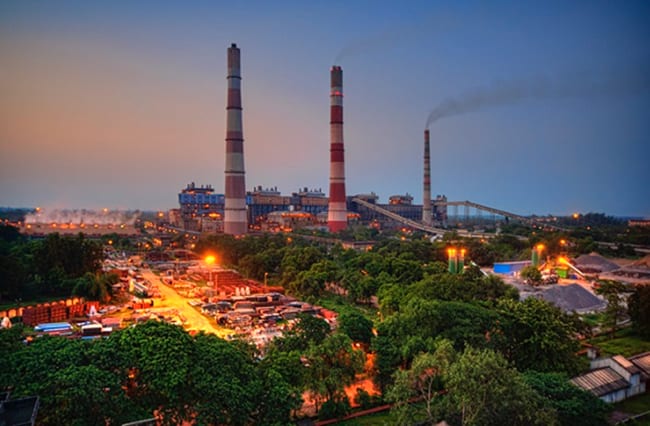India Starts Up Its First-Ever USC Coal Unit
Credit to Author: Sonal Patel| Date: Tue, 01 Oct 2019 04:00:06 +0000
The post India Starts Up Its First-Ever USC Coal Unit appeared first on POWER Magazine.
NTPC Ltd., one of India’s largest power generating companies, on Sept. 3 announced it had commissioned the country’s first ultrasupercritical (USC) coal-fired unit at the two-unit 1,320-MW Khargone plant that is under construction in the state of Madhya Pradesh.
The development marks a major milestone for India, which depends on coal for 56% of its total power capacity of 356 GW but has ratified the Paris Agreement, and pledged to reduce its emissions intensity of gross domestic product by about a third by 2030 compared to 2005 levels. To meet its climate objectives, government plans call for a drastic slash in coal’s share so that it will reach 45% of a planned capacity expansion to 480 GW by the end of 2022. During that period, India will also work to increase its share of renewables from the current 22% to 37%.
The newly commissioned Khargone USC unit has a capacity of 660-MW and an efficiency of 41.5%, which is about 3.3% more than the conventional fleet in India. In 2018, according to Wood Mackenzie, 96% of India’s 159 GW coal-fired capacity was subcritical, and only 4% was supercritical. Notably, the units feature steam parameters of 600C and pressure of 270 kilograms per square centimeter, allowing them to consume less coal to produce as much power as supercritical units.
As Gopalakrishnan Venu, executive director of Engineering at NTPC, pointed out at the 9th International Conference on Clean Coal Technologies in Houston, Texas, in June, high-efficiency low-emissions (HELE) installations are notable in India because the country’s fleet is founded on years of experience it has gained customizing early imported technologies to fit the unique conditions of Indian coal, which is mostly bituminous with relatively low moisture but a high ash content of between 30% and 50%. (Comparatively, coal traded on the international market rarely exceeds 15% ash content.) In the 1990s, India established a full domestic value chain, from design to construction and operation, for subcritical plants, and in recent years, it has expanded plant sizes while reaching supercritical temperatures.
The Khargone USC units (Figure 5) will use 7.65 million tons per year of blended coal—Indian and imported, in a ratio of 70:30—with a sulfur content of up to 0.5% and an ash content of between 40% and 43%, NTPC said. It will source about 15 million tons per year from the newly opened Pakribarwadih captive coal mine in Jharkhand state, about 500 miles away. According to the project’s engineering, procurement, and construction contractor, Indian conglomerate Larsen & Toubro Ltd., the plant’s two boilers and two steam turbine generators were manufactured by L&T-MHPS, a 51:49 joint venture between Larsen & Toubro and Japan’s Mitsubishi Heavy Industries subsidiary Mitsubishi Heavy Power Systems.

5. India’s state-run firm NTPC has commissioned the country’s first ultrasupercritical (USC) coal-fired unit at the 1,320-MW Khargone plant in the state of Madhya Pradesh. Courtesy: NTPC
Khargone is the first of a series of more efficient coal units that are under construction in India. An NTPC official confirmed that other 600C units are under construction at Telangana and North Karanpura, and the freshly tendered Lara 2 and Singrauli 3 units will also be ultrasupercritical.
As NTPC has noted, USC technology is a key step in the Indian government’s April 2017–launched program to develop an 800-MW coal-fired advanced USC (A-USC) power plant using indigenous technology. The program is being led by NTPC (a company in which the government holds a 70% stake), major equipment manufacturer Bharat Heavy Electrical Ltd. (BHEL, 63% state-owned), and state research entity the Indira Gandhi Centre for Atomic Research. NTPC’s Venu in June noted India could start the first A-USC demonstration at NTPC’s 2,090-MW Sipat site in Chhattisgarh State in 2020, a project it intends to follow with a 10-unit A-USC fleet.
In July, NTPC and BHEL signed a memorandum of understanding to form a joint venture company that will set up the demonstration plant. On Sept. 25, the company issued notices inviting tender (NIT) on a single-tender basis to BHEL for an engineering, procurement, and construction package for the project. The tender is NTPC’s second global tender.
“The fructification of the technology demonstration full-scale plant shall be a firm testimonial to the country’s climate commitment as it is a voluntary initiative,” NTPC said. “It will also support fulfillment of the NDC (Nationally Determined Contributions) committed by India as part of the Paris Climate Agreement. Further, there will be many intangible benefits in terms of [a] large number of spin-off technologies being developed, development of a large cadre of technologists, building confidence in home-grown technologies,” it said.
The post India Starts Up Its First-Ever USC Coal Unit appeared first on POWER Magazine.